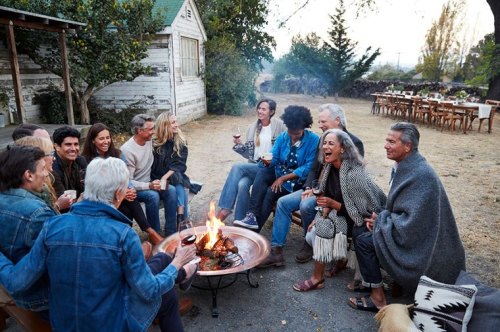The 9 rules to follow for living a long, healthy (and happy!) life
From California to Greece and Japan, fthe world's longest-living communities all share the same nine traits.

How do you live a long and healthy life? A few things can help, like eating whole and nutritious foods (as often as you can), making time to sweat and get your heart rate up, and doing things that make you happy.
Simple, right? Not so much. Keeping them up on a daily basis can be impossible at times. (Plus, with so many people saying their own personal experiences with health, it can hard to pinpoint exactly what it is that leads to a long life—other than luck.)
But brothers Nick and Dan Buettner made that their mission. As the founders of Blue Zones, they traveled the globe to find the communities that not only had the longest life expectancy, but also had the highest population of people over 100, with the lowest rate of disease.
Which cities came out on top? Okinawa, Japan; Sardinia, Italy; Nicoya, Costa Rica; Icaria, Greece; and Loma Linda, CA.
And, perhaps unsurprisingly, the Buettner brothers’ research found that all of these cities shared the same nine qualities—despite their geographic differences in climate and culture. At Adidas’ Future of Fit panel this past week at SXSW, Nick Buettner shared this intel, as well as ideas on channeling that wisdom into our everyday lives. (Spoiler: It’s a lot less complex than it seems.)
Scroll down to see the 9 shared qualities to follow for living to past 100.

1. The communities are built for movement
“In America, there has been a decline in biking and walking cities, but in these five cities it was the norm—people were able to walk and bike to their school or friend’s house,” Buettner explains. “They also didn’t have the conveniences that we here in America have right in our homes. For example, in Costa Rica, to make the corn tortillas, people had to manually pound the corn with their hands, rather than have a food processor.” (He even told me he met a 104-year-old woman who still mowed her lawn each day with a machete.)
2. Every person has a strong sense of purpose
A common thread that Buettner found in his research is that every person could articulate what they contributed to their community. “Whether they were 20 or 100, every person I encountered could explain their place in their town to me when I asked, and that’s tied to seven years of longevity,” he says.
3. A plant-based diet reigns supreme
Perhaps unsurprisingly, a diet similar to the Mediterranean diet was found to be a significant contributor to longevity. “They did eat meat, but it was about the size of a deck of cards and only about four times a month, so a lot different than here,” Buettner explained. (Sounds like Tom and Gisele might be onto something?)
4. Overall, they simply eat less
“The bottom line, though, is that while they didn’t pay strict attention to their diets, they had a lower caloric intake,” he says. “If you look at America’s menus and diets, the caloric intake is through the roof.”
5. But, they still drink red wine
Filled with antioxidants and heart healthy benefits, red wine was never off the table for the long-living residents in these communities, Buettner adds. (But what about wine-infused coffee?)
6. They know how to downshift
Along with wine, all of these communities have simple, citywide ways to reduce stress. “As we all know, stress is linked to chronic inflammation, which is tied to most age-related diseases,” he explains. “Between napping, ancestor veneration, or other religious ceremonies, people knew to take time for themselves every day.”
7. All are faith-based communities
Although they are spread across the globe, each city focuses on faith. “These community-driven goals and beliefs helped create purpose, connection, and fulfilment for all residents—which are all huge indicators of lifespan,” Buettner says.
8. They put their families first…
Even beyond faith, people prioritize their loved ones: “They had a strong sense of love with their families,” he explains. “Isolation is becoming an extra-indicator of stress and disease—people who have strong connections to loved ones are happier and healthier for longer.”
9. …but have friends to call when they need support
“Twenty-five years ago, the average person had three best friends. Today, it’s down to 1.5. That’s equivalent to smoking 20 cigarettes a day,” Buettner says. “At the end of the day, no diet or exercise is more important than having friends you can call up whenever you need to just talk or vent about something going on.” (BRB, FaceTiming my best friend.)
Here’s how to get boost your longevity by finding happiness in every part of your life. And for a little extra age-related inspo, this 107-year-old poet has some major mindfulness lessons.
Sign Up for Our Daily Newsletter
Get all the latest in wellness, trends, food, fitness, beauty, and more delivered right to your inbox.
Got it, you've been added to our email list.










